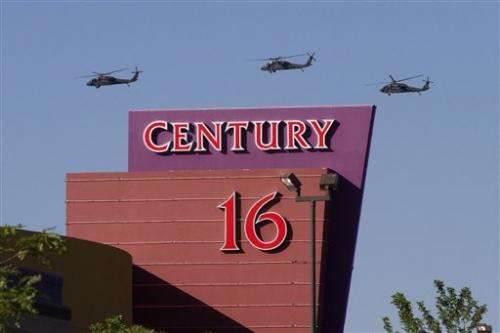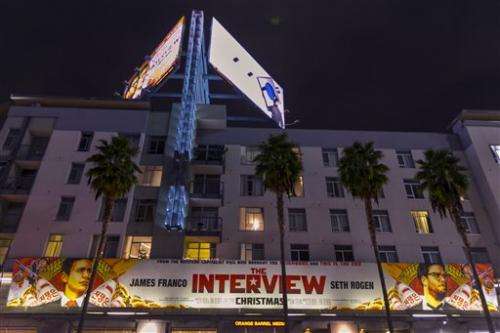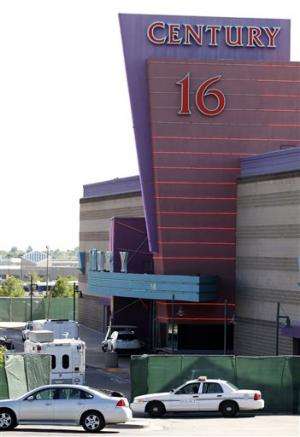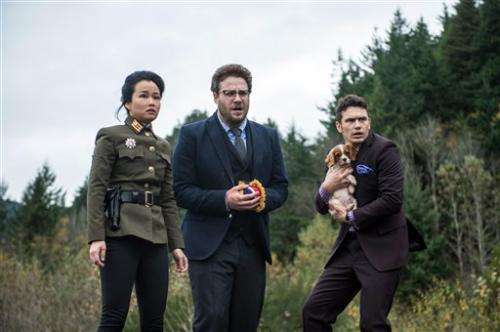2012 movie massacre hung over 'Interview' decision

When a group claiming credit for the hacking of Sony Pictures Entertainment threated violence against theaters showing "The Interview" earlier this week, the fate of the movie's big-screen life was all but sealed.
Even though law enforcement didn't deem the threats of violence credible at the time (the FBI has since confirmed North Korean was behind the hack attack), theater owners and Sony undoubtedly considered the 2012 massacre of a dozen people in a Colorado movie theater. That attack came without warning, and at the time there was no precedent for such mass violence against a U.S. movie audience.
Yet the theater's owners still face 20 lawsuits over the bloodshed, with survivors and victims' families contending that more should have been done to protect those who went to see a midnight showing of "The Dark Knight Rises."
Cinemark Holdings, Inc., argues it could not have foreseen the mass shooting, but experts say the same argument couldn't be used if violence broke out at a showing of "The Interview."
"It wasn't worth the risk," said Eric Wold, a movie exhibitor analyst with B. Riley & Co.
"The Interview" was expected to account for less than two percent of fourth quarter earnings for movie theaters, Wold said, so removing it from screens was not a difficult financial decision. Due to digital projections, theater owners can quickly re-program their screens to show other movies, such as new releases "The Hobbit 3" or "Night at the Museum." ''It's the press of a button," Wold said.
The alternative could have been serious injuries to moviegoers as well as multiple lawsuits if the group calling itself the Guardians of Peace, or a copycat, attacked a cinema, said Jonathan Handel, a lawyer and professor at the University of Southern California Gould School of Law.

"That's a lot of liability hanging over the theater chain," Handel said.
He noted that mall owners and other studios had pressured Sony to cancel the Christmas Day release of "The Interview," which stars Seth Rogen and James Franco. "They don't want the movie-going experience on Christmas Day to resemble check in at LAX," he said.
The film features an assassination plot against North Korean leader Kim Jong Un and the nation has denounced the movie. U.S. officials believe they have linked North Korea to the hacking of Sony's servers, which resulted in the theft of unreleased films, scripts, financial and medical information on employees and other corporate data.
It was only a matter of hours after hackers threatened massive violence against any theater showing "The Interview" that exhibitors started dropping the film. And no wonder.
"If, God forbid, something happened, they're the ones who would be responsible for any lack of security or decisions that were made that led to the incident," said entertainment attorney Uri Fleming of the firm Kleinberg Lange Cuddy & Carlo.
It remains unclear how a jury will perceive the case against Cinemark, which operated the Aurora, Colo., theater that James Holmes attacked in July 2012 during a midnight screening of the final installment of the latest Batman trilogy.

In court filings, lawyers for victims of the shooting have noted that Cinemark deployed extra security at some of its midnight "Dark Knight Rises" screenings and had employed a security firm to assess the risk of a drug cartel attacking a theater along the U.S.-Mexico border.
In an August ruling rejecting a motion by Cinemark to throw out the Aurora victims' suits, U.S. District Court Judge R. Brooke Jackson wrote that whether the company could have been expected to deploy extra security without a threat against its theaters "is not an easy question to answer."
However, the judge noted that moviegoers are especially vulnerable to attack.

"Although theaters had theretofore been spared a mass shooting incident, the patrons of a movie theater are, perhaps even more than students in a school or shoppers in a mall, 'sitting ducks,'" Jackson wrote.
Fleming, the entertainment attorney, said Sony and the theater chains are unlikely to face any significant repercussions from pulling "The Interview."
"Business relationships are the glue that bind (Hollywood)," he said.
© 2014 The Associated Press. All rights reserved.




















